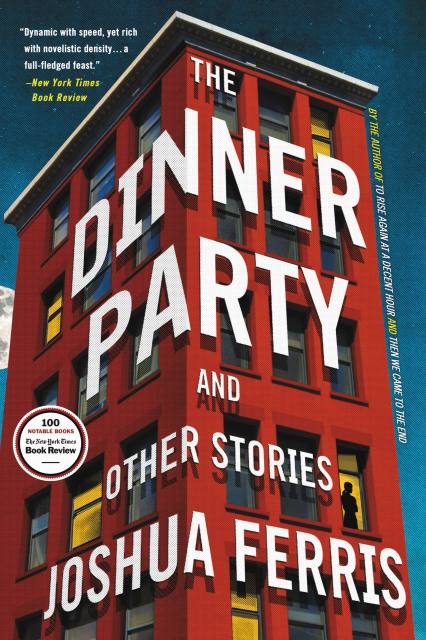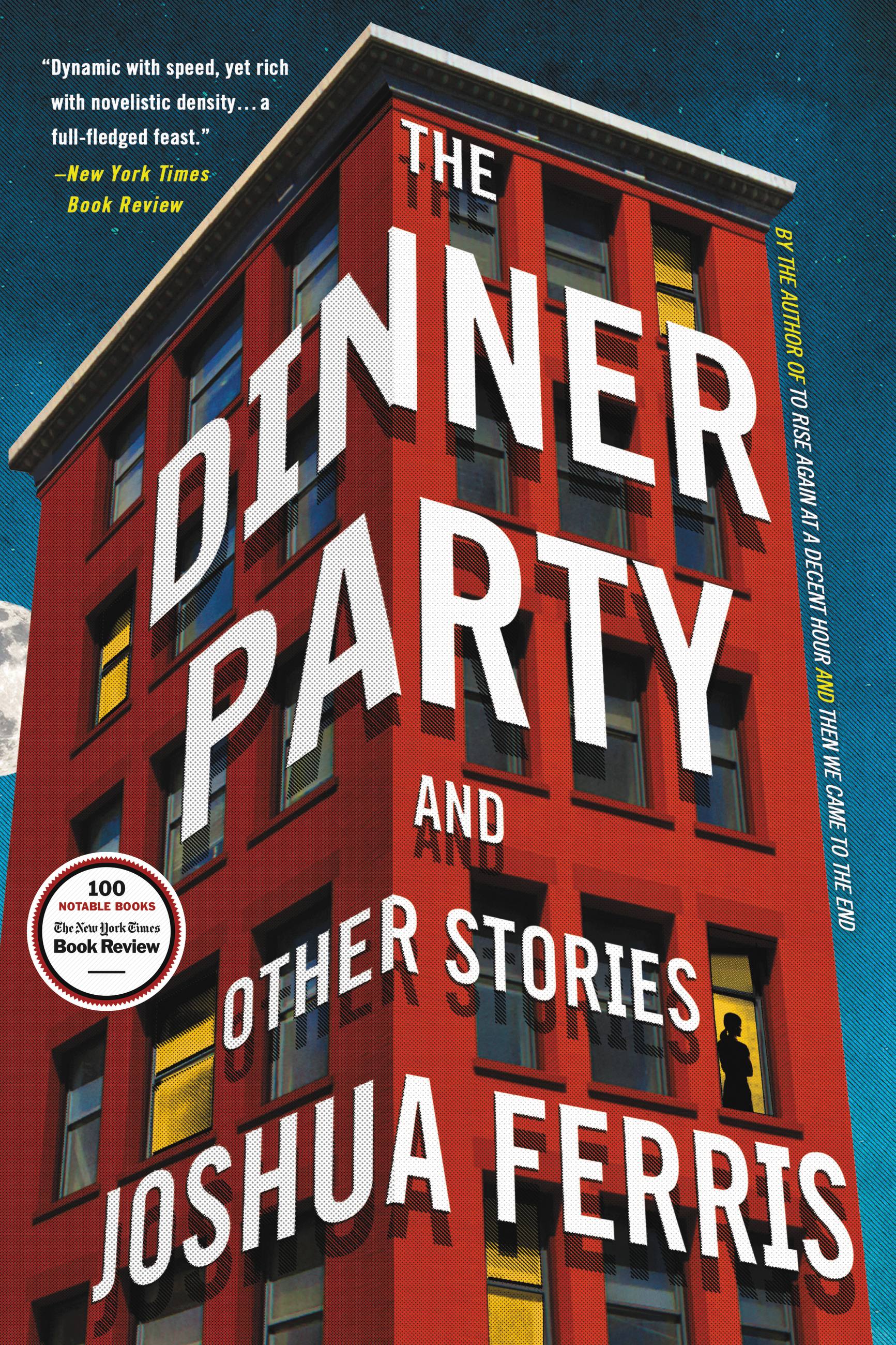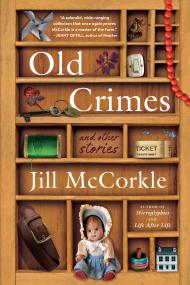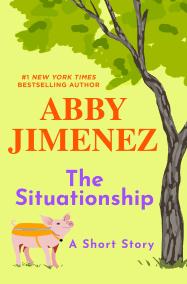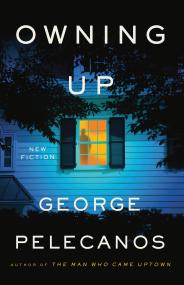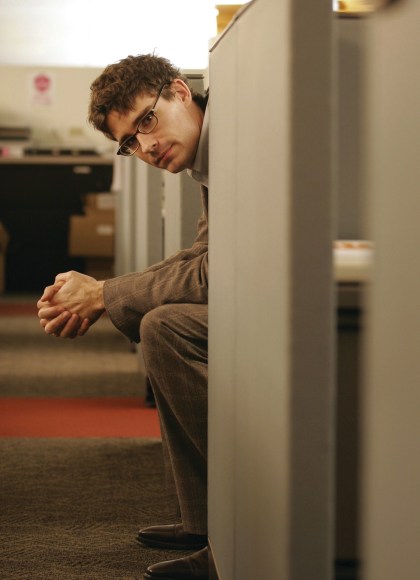The Dinner Party
Stories
Contributors
Formats and Prices
- On Sale
- May 2, 2017
- Page Count
- 256 pages
- Publisher
- Little, Brown and Company
- ISBN-13
- 9780316465977
Price
$5.99Price
$7.99 CADFormat
Format:
- ebook $5.99 $7.99 CAD
- Audiobook Download (Unabridged)
- Trade Paperback $15.99 $20.99 CAD
Buy from Other Retailers:
A New York Times Book Review Notable Book of the Year: The first collection of short stories from the critically acclaimed, prize-winning author of To Rise Again at a Decent Hour
These eleven stories by Joshua Ferris, many of which were first published in The New Yorker, are at once thrilling, strange, and comic. The modern tribulations of marriage, ambition, and the fear of missing out as the temptations flow like wine and the minutes of life tick down are explored with the characteristic wit and insight that have made Ferris one of our most critically acclaimed novelists.
Each of these stories burrows deep into the often awkward and hilarious misunderstandings that pass between strangers and lovers alike, and that turn ordinary lives upside down. Ferris shows to what lengths we mortals go to coax human meaning from our very modest time on earth, an effort that skews ever-more desperately in the direction of redemption.
There’s Arty Groys, the Florida retiree whose birthday celebration involves pizza, a prostitute, and a life-saving heart attack. There’s Sarah, the Brooklynite whose shape-shifting existential dilemma is set in motion by a simple spring breeze. And there’s Jack, a man so warped by past experience that he’s incapable of having a normal social interaction with the man he hires to help him move out of storage.
The stories in The Dinner Party are about lives changed forever when the reckless gives way to possibility and the ordinary cedes ground to mystery. And each one confirms Ferris’s reputation as one of the most dazzlingly talented, deeply humane writers at work today.
These eleven stories by Joshua Ferris, many of which were first published in The New Yorker, are at once thrilling, strange, and comic. The modern tribulations of marriage, ambition, and the fear of missing out as the temptations flow like wine and the minutes of life tick down are explored with the characteristic wit and insight that have made Ferris one of our most critically acclaimed novelists.
Each of these stories burrows deep into the often awkward and hilarious misunderstandings that pass between strangers and lovers alike, and that turn ordinary lives upside down. Ferris shows to what lengths we mortals go to coax human meaning from our very modest time on earth, an effort that skews ever-more desperately in the direction of redemption.
There’s Arty Groys, the Florida retiree whose birthday celebration involves pizza, a prostitute, and a life-saving heart attack. There’s Sarah, the Brooklynite whose shape-shifting existential dilemma is set in motion by a simple spring breeze. And there’s Jack, a man so warped by past experience that he’s incapable of having a normal social interaction with the man he hires to help him move out of storage.
The stories in The Dinner Party are about lives changed forever when the reckless gives way to possibility and the ordinary cedes ground to mystery. And each one confirms Ferris’s reputation as one of the most dazzlingly talented, deeply humane writers at work today.
-
Praise for Joshua Ferris's THE DINNER PARTY:
-
A New York Times Notable BookWashington Post Notable Fiction NPR's Best Books of 2017 The Guardian Best Books of 2017Esquire Best Books of the Year The Week Best Books of 2017
-
"A magnificent black carnival of discord and delusion....For some accomplished novelists--and Ferris is one of the best of our day--short stories are mere doodles, warm ups or warm downs, slight variations on themes better addressed at length. Not so for Ferris. Dynamic with speed, yet rich with novelistic density, his stories make The Dinner Party a full-fledged feast."Will Blythe, New York Times Book Review
-
"Plenty of novels, memoirs and cultural studies have explored the end of men or the failings of masculinity. But Ferris, a darkly comic writer who feels like the novelist equivalent of the filmmakers Joel and Ethan Coen, has managed to write a series of stories on the subject that feels fresh. His male characters mess up, in small and spectacular fashion, but their misdeeds often prompt our sympathy, thanks to Ferris's insightful narration."Ian Shapira, The Washington Post
-
"Ferris finesses the line between tragedy and comedy, and his sly wit often surfaces in sarcastic, offbeat ways...The Dinner Party provides a fine showcase for his work."Heller McAlpin, NPR.org
-
"Ferris is an incisive observer, and his descriptions of even the most quotidian situations are elegant and fresh."Eliot Schrefer, USA Today
-
"Everything comes mordantly alive in the priceless imagination of Ferris....His perverse short narratives do not disappoint."Janet Maslin, New York Times, Books to Breeze Through This Summer
-
"Observational and piercing, Ferris's short stories expose how fraught and emotionally explosive the search for connection with other human beings can be."Angela Ledgerwood, Esquire, 20 Best Books of 2017 (so far)
-
"The Dinner Party is a collection of stories about quiet, domestic chaos... I love it. The titular story finds a couple awaiting the arrival of dinner guests who never materialize.... equal parts Cheever and Carver....a strong set of stories about infidelity, jealousy, and neurotic insecurity."Kevin Nguyen, GQ, Best Books You'll Read In May
-
"This collection hits the sweet spot between character realism and existentially wry musings on modern life... In the past, Mr. Ferris has drawn favorable comparisons with Jonathan Franzen, but this collection shows Mr. Ferris as the funnier of the two. None of Mr. Franzen's novels has been as light or enjoyable to read."Nathan Pensky, The Pittsburgh Post-Gazette
-
"[Ferris] isn't merely a master of description, but he's got a way of telling us everything we need to know about a character with just a few spare words."Moira Macdonald, The Seattle Times
-
"Ferris's three novels have earned him a reputation as a high-concept high-wire artist, always working the line between comedy and tragedy, the domestic and the outlandish. His stories, by comparison, are compact gems of timing and everyday absurdity, and finally, here they are in one place. Hollywood satire, marriage-ending secrets, cracked minds, broken families: Ferris renders contemporary life as a parade of sad clowns."New York Magazine, Top 10 Spring Books preview
-
"A collection that show[s] humanity at its most awkward and insightful."New York Observer, 10 Most Anticipated Books of Spring
-
"Ferris has a sure hand when it comes to the nuances of interpersonal relationships. He knows the thin line between awkward and easy, and when silence between two people can be a sign of strain or comfort. Ferris walks this territory so well that we often see our own complicated selves reflected in his writing... Though Ferris' assured collection may seem laced with hints of despair, the stories are full and rounded, sad but often also tinged with humor and rich in empathy."Booklist
-
"Ferris has mastered a kind of fictional sucker punch, and he'll get you every time."Kirkus
-
"[These stories] explore the fraying psychologies of their protagonists by way of dark humor and understated tragedy. In the excellent, surreal title story, the fissures in a childless couple's marriage become unbridgeable divides after their close friends fail to attend a dinner party... contain moments of sharp levity and intense insight...[Ferris is an] immense talent."Publishers Weekly
-
"Ferris invites you to make a meal out of his mordant tales about life's quicksilver changes."Sloane Crosley, Vanity Fair
-
"This season's standout short-story collections are masterful exercises in brevity, proving that sometimes less really is more.... Novelist Joshua Ferris returns with his first, highly anticipated story collection. Each entry showcases his customary wit and understanding."Thomas Gebremedhin, Wall Street Journal Magazine
-
"Throughout these 11 stories, the range of settings and characters makes for a recurring sense of surprise...Reading a collection of short stories by an emerging master of the form is one of the great literary pleasures, especially when the writer treats them as a set of variations on a powerful theme. A steady ground bass pulses through all of Ferris' narratives: the fatefulness of our lives, the uncanny and often hilarious ways in which our fragile hearts and massive egos determine our destinies."Michael Alec Rose, BookPage
-
"The collection pulls together stories that promise the, 'deeply felt yearnings, heartbreaking absurdity, and redemptive humor of life,' for which Ferris is so well known."The Millions
-
"The title story, a remarkable, John Cheever-esque tale, shows a couple preparing dinner for their friends ....[These stories] widen Ferris' range and prove stunning feats of compassion, such as "The Valetudinarian," which follows an early retiree and widower as he blunders with a prostitute. He collapses, and when his neighbor steps in to help, she is "struck dumb by his perfect helplessness." It's Ferris' great gift, and, indeed, readers will surely be struck dumb with empathy for these memorable cranks and depressives."Josh Cook, Minneapolis Star Tribune
-
"Displays his gift for dark humor."Michael Schaub, A Best Book of May pick in Men's Journal
-
"Ferris's pitch is perfect. These moments of crisis and compassion, humanity and wit, are perfect episodes of some television series that doesn't need serialization to make you want to keep coming back for more. They aren't chapters, leading to some conclusion, they are moments, shading, changing, building lives."Greg Hudson, Sharp
-
"Exposes the true, and sometimes absurdly comic, wiles of men who flail through life in remarkably routine fashion."The Fader
-
"Tales of divorce and marriages falling apart weave together a complex understanding of human emotion that surpasses the family drama settings and reminds us why Joshua Ferris is a talent to be reckoned with."Ilana Masad, Read it Forward, Favorite Reads of May 2017
-
"Joshua Ferris is the master of capturing the ennui of the modern world without getting bogged down by the details-even his most minute or quotidian observations carry with them the sweeping and even, sometimes, spiritual."Jaime Green, Google Play Summer Reading
-
"Ferris reveals himself as an heir to the work of John Cheever... The Dinner Party's lightning flashes of insight are yet further evidence of [Ferris's] talent."Harvey Freedenberg, Book Reporter
-
"[Ferris] brings wit and grace to the dark corners of human nature and shines a light into the beautiful complexity of ordinary lives."Noelle Phillips, The Denver Post, Summer 2017 Reads
-
"Compelling...Ferris' writing is dark, funny and cold."Trine Tsouderos, The Chicago Tribune
-
PRAISE FOR TO RISE AGAIN AT A DECENT HOUR:
-
"To Rise Again at a Decent Hour is beautifully written. It's also funny, thought-provoking, and touching. One hesitates to call it the Catch-22 of dentistry, but it's sort of in that ballpark. Some books simply carry you along on the strength and energy of the author's invention and unique view of the world. This is one of those books."Stephen King
-
"This is one of the funniest, saddest, sweetest novels I've read since Then We Came to the End. When historians try to understand our strange, contradictory era, they would be wise to consult To Rise Again at a Decent Hour. It captures what it is to be alive in early 21st-century America like nothing else I've read."Anthony Marra, author of New York Times bestseller A Constellation of Vital Phenomena
-
"Gut-bustingly funny... its wit is so sharp, its fake-biblical texts ... so clever and its reach so big ... It's an eminently worthy nominee for the Booker Prize or any other... a major achievement."Janet Maslin, New York Times
-
A "wry, intelligent novel that adroitly navigates the borderland between the demands of faith and the persistence of doubt...In seizing upon both the transitory oddities of contemporary life and our enduring search for meaning, Joshua Ferris has created a winning modern parable...He's a gifted satirist with a tender heart, and if he continues to find targets as worthy as the ones he skewers here, his work should amuse and enlighten us for many years to come."Shelf Awareness
-
"Enjoy the first great novel about social-media identity theft. . . . It's an atheist's pilgrimage in search not of God but of community . . . O'Rourke's search feels genuine, funny, tragic, and never dull. It'll also leave you flossing with a vengeance."Boris Kachka, GQ
-
"[Ferris] shrewdly stages a kind of theological symposium in [an] uncomfortably intimate place, conducted halfway between levity and overeager sincerity... It's a pleasure watching this young writer confidently range from the registers of broad punchline comedy to genuine spiritual depth. The complementary notes of absurdity, alienation and longing read like Kurt Vonnegut or Joseph Heller customized for the 21st Century."Sam Sacks, The Wall Street Journal
-
"A novel that raises questions about meaning and belonging, even if the only answer is that we will never know...This is the novel's peculiar brilliance, to uncover its existential stakes in the most mundane tasks...[a] curiously provocative novel."David L. Ulin, Los Angeles Times
-
"To Rise Again at a Decent Hour reminds us that even existential suffering can prove both charming and hilarious...Ferris has written an arresting novel, a playfully ironic riff on how a man can come to know himself...the cumulative effect of the novel tugs the heart just as surely as it sparks the mind."Bruce Machart, Houston Chronicle
-
"Brilliant...Ferris has managed to blend the clever satire of his first book...with the grinding despair of his second . . . The result is a witty story. At his best, which is most of the time, Ferris spins Paul's observations and reflections into passages of flashing comedy that sound like a stand-up theologian suffering a nervous breakdown."Ron Charles, The Washington Post
-
"An engrossing and hilariously bleak novel . . . This splintering of the self hasn't been performed in fiction so neatly since Philip Roth's Operation Shylock."John Freeman, Boston Globe
-
"A story made exhilarating by Ferris' wickedly dark humor and keen intelligence. The brilliant prose...never preens. It simply pulls the reader along in an effortlessly smooth ride. Ferris makes the tug-of-war between Paul's searching mind and his low spirits utterly fascinating...Ferris' three novels place him in grand company among our younger novelists. . . . All the same, he's a unique American original."Dan Cryer, The San Francisco Chronicle
-
"Ferris's trademark blend of dark satire and ominous absurdity suits his subject, and his focus on one character allows him to perform a psychological excavation of his subject in conjunction with his examination of modern life...The result is a stimulating, bittersweet read."Claire Fallon, The Huffington Post
-
"The author has proved his astonishing ability to spin gold from ordinary air . . . Ferris's third novel falls somewhere between the voice-driven power of the first [novel] and the idea-driven metaphor of the second . . . [He] remains as brave and adept as any writer out there."Lauren Goff, The New York Times Book Review
-
"[An] alternately sad and hilarious new book...To Rise Again at a Decent Hour showcases the wit, intelligence and keen eye for workplace absurdity the author displayed to such great effect in his first novel . . . a welcome outlet for Ferris' enormous virtuosity as a philosopher and storyteller. Ferris raises profound questions about the role of faith, not just in belonging, but in living."Daniel Akst, Newsday
-
"[Ferris has] the keen ability to traverse the high wire of satire and lyricism, to at once write a sentence that can drop a reader's jaw, then make them giggle in the next . . . a writer perfectly at ease with both the bleakly absurd and the deeply humane, using them equally in hopeful pursuit of a redemptive truth."Gregg LaGambina, The A.V. Club
-
"Suffice it to say that To Rise Again at a Decent Hour isn't just one of the best novels of the year, it's one of the funniest, and most unexpectedly profound, works of fiction in a very long time."Michael Schaub, NPR.org
-
"With almost Pynchon-esque complexity, Ferris melds conspiracy and questions of faith in an entertaining way...Full of life's rough edges, the book resists a neat conclusion, favoring instead a simple scene that is comic perfection... Smart, sad, hilarious and eloquent, this shows a writer at the top of his game and surpassing the promise of his celebrated debut."Kirkus (Starred Review)
Newsletter Signup
By clicking ‘Sign Up,’ I acknowledge that I have read and agree to Hachette Book Group’s Privacy Policy and Terms of Use
